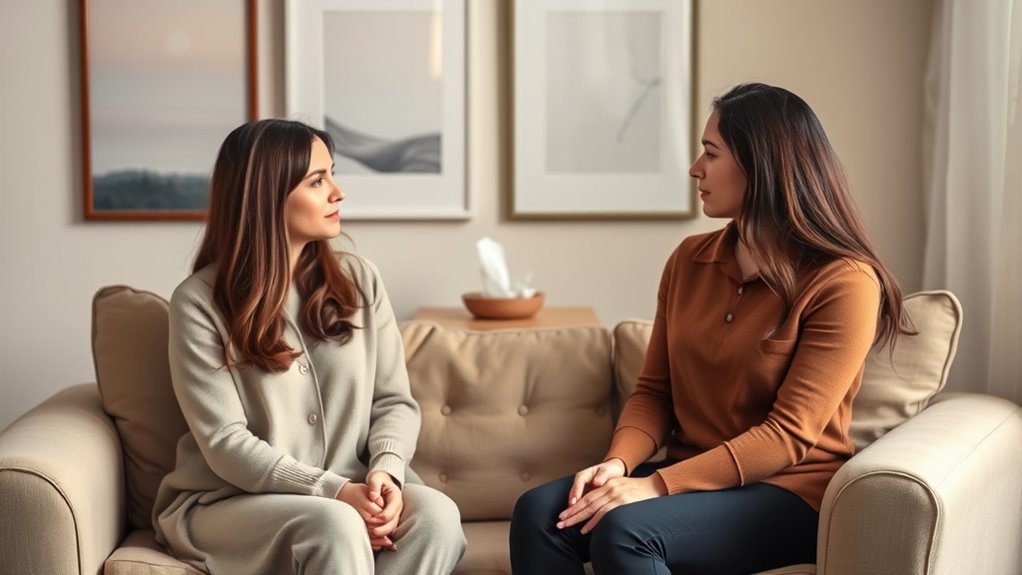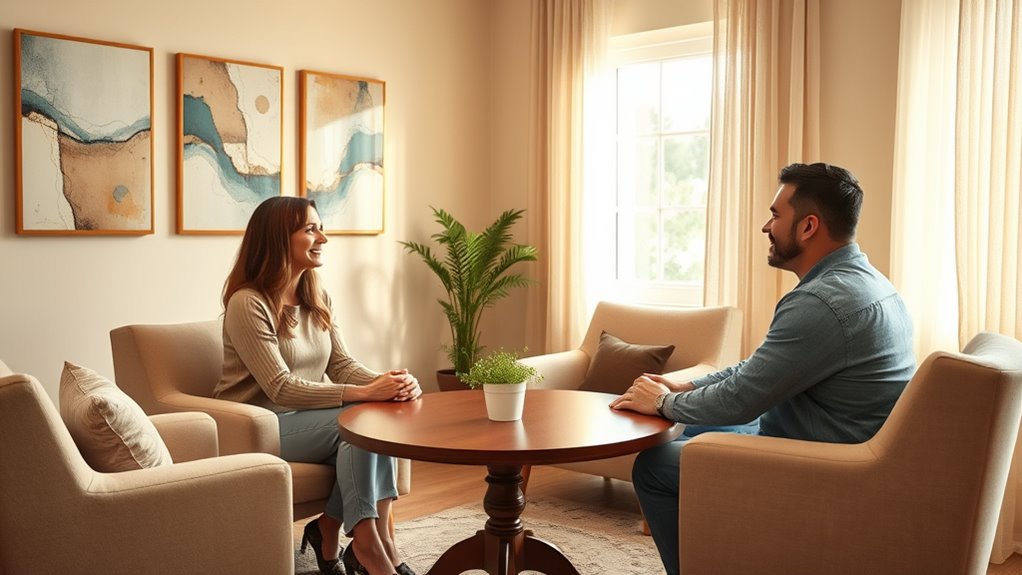In couples therapy, you can expect structured sessions focused on improving communication, resolving conflicts, and strengthening your emotional connection. You’ll often practice active listening, use “I” statements, and learn to manage personal triggers. Be prepared to share honestly, stay open-minded, and commit to regular attendance. Patience is key, as progress takes time. Continuing ahead, you’ll discover practical tips to get the most out of your therapy experience and build a healthier relationship.
Key Takeaways
- Couples therapy focuses on improving communication, resolving conflicts, and strengthening emotional connection.
- Be open, honest, and prepared to share your feelings and issues during sessions.
- Expect to practice active listening and use respectful “I” statements.
- Regular attendance and active participation are essential for meaningful progress.
- Success involves patience, reflection, and applying new skills outside of therapy sessions.

Have you ever wondered if couples therapy could help strengthen your relationship? Many couples do, especially when they face ongoing issues or feel stuck in patterns that seem hard to break. When you begin couples therapy, one of the main goals is to improve your communication skills. You’ll learn how to express your feelings and needs clearly, without resorting to blame or criticism. Effective communication is the foundation for resolving conflicts and building understanding between you and your partner. During sessions, your therapist will guide you in practicing active listening, which means genuinely hearing your partner’s perspective without interrupting or jumping to conclusions. This process helps you both feel heard and validated, reducing misunderstandings that often escalate conflicts.
Conflict resolution is another critical focus of couples therapy. Instead of avoiding disagreements or letting resentment fester, therapy encourages you to approach conflicts constructively. You’ll discover healthier ways to address disagreements, such as identifying underlying emotions and finding common ground. Your therapist might introduce techniques like time-outs or “I” statements, which help keep conversations respectful and productive. As you work through conflicts in therapy, you’ll gain insight into your own triggers and learn how to manage them more effectively. Over time, this leads to fewer destructive fights and a greater ability to resolve issues as they arise, rather than letting them simmer and cause long-term damage. Recognizing the importance of emotional connection can help you prioritize intimacy and understanding, fostering a stronger bond.
Preparing for couples therapy involves some practical steps. First, be open-minded and willing to share honestly, even if it feels uncomfortable at first. Remember that therapy isn’t about assigning blame but about understanding and growth. Think about the issues you want to address beforehand—this helps focus your sessions and makes the most of your time. It’s also helpful to establish a commitment to attend regularly and to set aside time for reflection between sessions. This way, you can practice new skills like improved communication and conflict resolution outside the therapy room. Keep in mind that progress takes time, and patience is essential. Be kind to yourself and your partner as you navigate this process, knowing that every step forward strengthens your relationship’s foundation. Ultimately, couples therapy can be a powerful tool to build healthier communication, resolve conflicts more effectively, and deepen your connection.
Frequently Asked Questions
How Long Does Couples Therapy Typically Last?
The duration expectations for couples therapy vary based on your needs, but typically, sessions last about 50 minutes. You’ll usually attend weekly or biweekly sessions, which helps build momentum. Some couples see progress in a few months, while others may need longer. Your therapist will work with you to set goals and adjust session frequency as needed, ensuring you get the support you need throughout the process.
Can I Attend Therapy Sessions Alone?
Think of therapy as your personal toolkit; yes, you can attend individual sessions or solo therapy. These sessions allow you to explore your feelings and thoughts more deeply, like shining a flashlight into hidden corners. Attending solo doesn’t mean you’re stepping away from your partner’s journey; it’s about strengthening yourself first. Many therapists welcome individual work, helping you gain clarity and resilience before or alongside couples therapy.
What if My Partner Is Unwilling to Participate?
If your partner is resistant to participating, focus on understanding their concerns and gently addressing them. You can use motivation strategies like highlighting the benefits of therapy and emphasizing how it can improve your relationship. Remember, you can’t force them, but attending individual sessions might help you gain insights and strengthen your communication skills. Over time, your partner may become more open if they see positive changes.
Are There Specific Issues Couples Therapy Can’t Address?
You wonder if couples therapy can address every issue, but some are more challenging. For example, marital infidelity may require individual therapy to rebuild trust, while childhood trauma often needs specialized treatment beyond couples counseling. While therapy can help improve communication and understanding, it might not fully resolve deep-seated issues like trauma or betrayal without additional support. Be patient and open to combining different approaches for the best results.
How Do I Find a Qualified Couples Therapist?
When finding a therapist, start by checking their qualifications standards, like licensing and certifications. Look for someone with experience in couples therapy and specialized training if needed. You can ask for recommendations from friends, family, or your healthcare provider, and search online directories that verify credentials. Don’t hesitate to interview potential therapists to guarantee they’re a good fit, making your search more effective and comfortable.
Conclusion
Think of couples therapy as tending to a delicate garden—you’ll water it with honesty, nurture it with understanding, and watch it bloom anew. It’s a journey through stormy clouds toward clearer skies, where vulnerability becomes your guiding star. Embrace the process with an open heart, knowing that every step you take together helps weave a stronger, more resilient bond. With patience and effort, you’ll find your relationship blossoming into a beautiful, enduring masterpiece.









